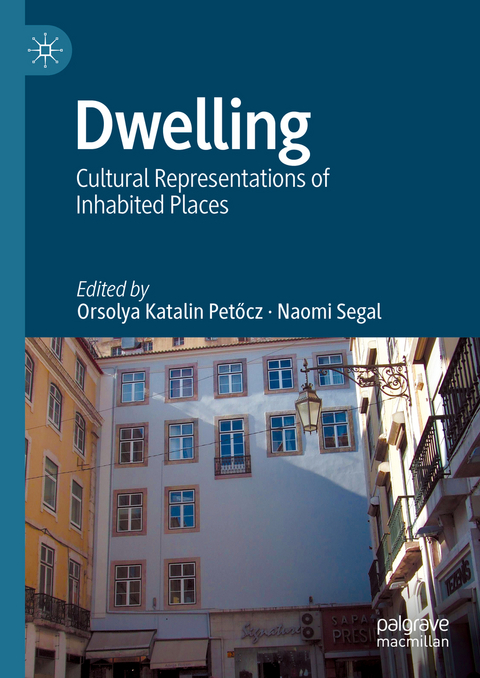
Dwelling
Springer International Publishing (Verlag)
978-3-031-56839-8 (ISBN)
- Noch nicht erschienen - erscheint am 06.08.2024
- Versandkostenfrei innerhalb Deutschlands
- Auch auf Rechnung
- Verfügbarkeit in der Filiale vor Ort prüfen
- Artikel merken
Framed by two longer essays which theorise how the psychology of home may change under sudden pressure and how social relations are embodied in windows, doors, walls and stairs, the book includes 18 further essays. Part I, 'Informal settlements', shows how a slum, urban development or nomadic life may create a self-sustaining identity; in Part II, 'Huts and bridges', impermanence shapes the state of dwelling, while Part III, 'Liminal bodies', presents bodies suspended at thresholds of change. Movement in time and space characterises the last three sections: Part IV, 'Moving home', depicts transitions and arrivals, Part V, 'Dwelling in Memory', focuses on recollections of past places and Part VI, 'Are we there yet?', points the way to a future in which the consulting-room changes to 2D, a family is exiled onto the small screen or we imagine breaking away altogether into outer space.
Orsolya Katalin Peto cz is a PhD student in the Faculty of Modern and Medieval Languages and Linguistics at the University of Cambridge. She explores queer testimonies across literature and the visual arts, with a focus on the accounts of survivors of World War II. Her work centres on sexuality, the Holocaust and migration. Her research articles have been published in Italian Studies, French Cultural Studies and Journal of Italian Cinema & Media Studies. Her co-authored piece '(Un)Desired Others' (2023) is related to her new project, the study of the stigma of promiscuity in the testimonies of Eastern European Holocaust survivors.
Naomi Segal is Professor Emerita at the Institute of Languages, Cultures and Societies, an honorary fellow of Queens' College Cambridge, a Chevalier dans l'Ordre des palmes académiques and a member of the Academia Europaea. She founded the IGRS in 2004 and represented the UK in the European Science Foundation 2005-2011. She researches in comparative cultural studies and is the author of 19 books, including monographs Consensuality: Didier Anzieu, Gender and the Sense of Touch (2009), André Gide: Pederasty and Pedagogy (1998), The Adulteress's Child (1992) and Narcissus and Echo (1988). She is currently completing a monograph on replacement.
Chapter 1 Introduction.- Chapter 2 Dwelling in a Digital Age: Biological Perspectives.- Chapter 3 Evolving Transhumance in Southern Oman: ancient traditions for modern realities.- Chapter 4 From Slums to Communities: Mapping a New Identity through Participatory Approaches.- Chapter 5 Myths of Progress: Real-estate Development, Private Property and Dwelling Outside Ownership.- Chapter 6 Dwelling in Desire: Standing on the pont Mirabeau.- Chapter 7 We must build huts": Jean-Marie Gleize's Temporary Dwellings.- Chapter 8 Thacchen: The Dwelling Body in the Rough House.- Chapter 9 Paul B. Preciado's Dwelling-in-mutation: The Show of Monstrosity.- Chapter 10 Let no more Days be Numbered: Florence Lam's Performances.- Chapter 11 Threshold Dwelling: algae and tufa, will you be more successful than me?.- Chapter 12 The Question of Home: Exclusion, Division and Forgetting in the World of the House.- Chapter 13 Dwelling and Exile: Vigée Le Brun and the Tools of her Trade.- Chapter 14 Home as a Liminal Space in Salman Rushdie's Quichotte (2019).- Chapter 15 Sensing the Continuity and Strangeness of the "Home" in the Darkness of a New Residence.- Chapter 16 Dwelling in the Memory Palace: Cultural Identity, Counter-memory and Storytelling in Anna Moï's Douze palais de mémoire.- Chapter 17 The City is Closing in: Raja Shehadeh's Going Home Searches for a Homeland.- Chapter 18 Dwelling in Narrative: Jewish-Muslim Relations in the Domestic Communities of Joëlle Bahloul and Karin Albou.- Chapter 19 Digital Dwelling and Defensive Domesticity: (De)constructing Spatialised Hospitality in Michael Haneke's Happy End.- Chapter 20 "Making Life Multiplanetary": Re-conceiving Dwelling in Space Tourism Discourse.- Chapter 21 Dwelling-spaces as Sites for the Virtual Consulting-Room.
| Erscheinungsdatum | 17.07.2024 |
|---|---|
| Zusatzinfo | XXII, 307 p. 26 illus., 20 illus. in color. |
| Verlagsort | Cham |
| Sprache | englisch |
| Maße | 148 x 210 mm |
| Themenwelt | Sozialwissenschaften ► Ethnologie |
| Sozialwissenschaften ► Soziologie | |
| Schlagworte | Digital Dwelling • exile • Home • Liminal Spaces • Migration Studies • moving • Places of memory • Post-Pandemic Homes • temporary homes |
| ISBN-10 | 3-031-56839-7 / 3031568397 |
| ISBN-13 | 978-3-031-56839-8 / 9783031568398 |
| Zustand | Neuware |
| Haben Sie eine Frage zum Produkt? |
aus dem Bereich


